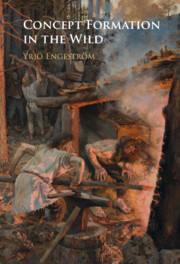This book is an invitation to engage in a new domain of research and practical interventions: concept formation in the wild. There are ample studies and theories of concept formation. But they mainly focus on the individual acquisition of well-defined concepts handed down by teachers and researchers, operating in classrooms and experimental laboratories. Little is known about how new concepts are collectively created and used in workplaces, communities, and social movements. It is time to start filling this lacuna with generative ideas and solid findings.
The perspective of studying concept formation in the wild has emerged through various collaborative efforts. I am grateful to Vaula Haavisto, Anu Kajamaa, Hannele Kerosuo, Monica Lemos, Swapna Mukhopadhyay, Jaana Nummijoki, Auli Pasanen, Marco Pereira Querol, Juhana Rantavuori, Päivi Ristimäki, Annalisa Sannino, Hanna Toiviainen, Irene Vänninen, Liubov Vetoshkina, and Jaakko Virkkunen, who have contributed to joint research projects and publications over the years. I also thank the Academy of Finland for funding the research project “Concept Formation and Volition in Collaborative Work.” Among international colleagues, I wish to thank especially Charles Bazerman, James G. Greeno, Rogers Hall, Ilana Seidel Horn, Ed Hutchins, Ivana Marková, and Nancy Nersessian, all of whom contributed to a special issue of Mind, Culture, and Activity, edited by Annalisa Sannino and myself about ten years ago as a first step toward opening up concept formation in the wild as a problematic and research field.
Most of the work that led to this book has been done at the Center for Research on Activity, Development and Learning (CRADLE) at the University of Helsinki. For about five years, I have also been involved in intense collaboration with the research group Research Engagement for Sustainable and Equitable Transformations (RESET), led by Annalisa Sannino at Tampere University. This collaboration has significantly enriched and deepened my understanding of concept formation in the wild, especially its volitional and agentive aspects. At the same time, we have witnessed rapid growth of exchange and collaboration among researchers pursuing cultural-historical activity theory (CHAT) and formative interventions around the globe. This is becoming a movement aimed at fostering and analyzing the creation of enacted utopias, that is, sustainable alternatives to capitalism. These initiatives may be seen as a globally distributed laboratory for concept formation in the wild.

